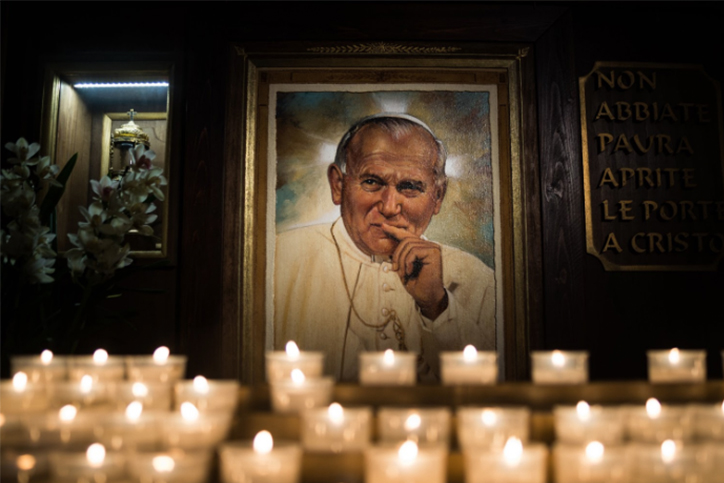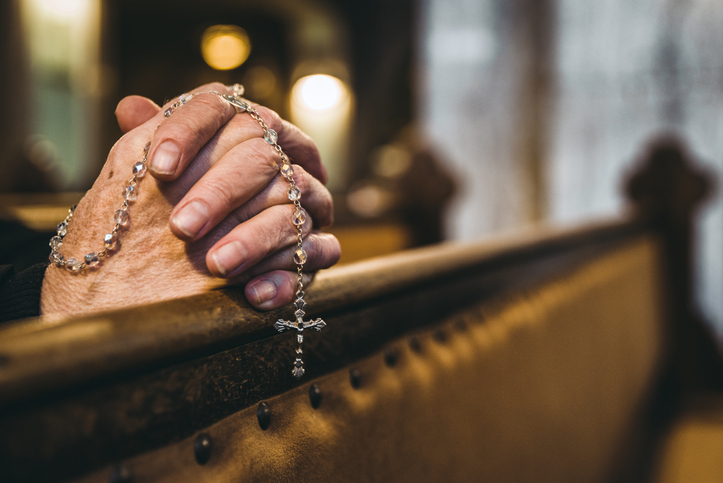There are days when everything goes ever-so-slightly wrong, aren’t there? When you feel you’re just not paying attention? I have those days fairly frequently. I snap at someone I care about; I’m oblivious to the person behind me in the checkout line who has only one item where I have ten; I oversleep and so skip my morning prayers; I end the day without having contributed anything positive to the world, much less evangelized it for Christ.
And then I read St. Luke’s words and think, there’s no hope for someone like me. How could I possibly think I’m good enough to enter the Kingdom of God? Jesus himself says it—the gate is narrow, he won’t recognize evildoers at the end, people will be cast out.
I’m in trouble here.
No matter how hard I try, those moments, those days, of inattention and lack of charity, of sensitivity, of kindness—they’re always with me. Just when I’m feeling the most in control, just when I’m feeling I have this faith thing down, that’s when all those demons rear their ugly heads. And it’s overwhelming.
Maybe a clue to my problem is in what I just said, that bit about “having this faith thing down.” Wait—you’re really that complacent? Maybe you should dial down a little of that hubris and give some thought to what your faith is about, rather than congratulating yourself on having it.
If I really think about my life, I’ll realize it’s made up of both those things—of having faith and living it out, and then quite often squandering it, becoming dangerously close to the people Jesus is talking about, those who are “not strong enough.”
And then… enter St. Paul. While he spends time in many of his letters urging the various communities of faith to buck up, as it were, to crack on, he occasionally shares words of incredible comfort. Today’s reading is one of those times. Listen, he says: I know. You have those days when you do everything wrong. I know. You’re weak in a whole lot of areas. I know. You’re not all that good at prayer. I know all this. But—and here’s where he extends the comfort—the Holy Spirit is with you. The Spirit intercedes. The Spirit will help make you holy. The Spirit will help make you good.
Alone, I am in trouble. But today’s readings are infused with an infinite joy, because they tell me that though the dangers are out there, and I must indeed face them, I am not facing them alone. These readings are about trust. They are about faith. They are about goodness. They are about how God does wonders and how I’d live a better life if I’d just let him work within me.
Which doesn’t mean I’m always going to feel it. One of my favorite authors, C.S. Lewis, wrote to a young convert some time after his own conversion: “It is quite right,” he says, “that you should feel that ‘something terrific’ has happened to you (it has) and be ‘all glowy.’ Accept these sensations with thankfulness as birthday cards from God, but remember that they are only greetings, not the real gift. I mean, it is not the sensations that are the real thing. The real thing is the gift of the Holy Spirit which can’t usually be—perhaps not ever—experienced as a sensation or emotion. The sensations are merely the response of your nervous system. Don’t depend on them. Otherwise when they go and you are once more emotionally flat (as you certainly will be quite soon), you might think that the real thing had gone too. But it won’t. It will be there when you can’t feel it. May even be most operative when you can feel it least” (The Collected Letters of C.S. Lewis).
And there’s the trick. The Holy Spirit is working in us, every day, all the time; but most of the time we’re just getting on with life and aren’t really paying that much attention. Yet, think of it: there is a miracle happening every single day in every single one of us! God has not only sent his Son to live and die for us, he’s left us with the Holy Spirit to guide us, not just when we feel “glowy,” but even and especially when we don’t. When we’re short-tempered and tired. When we’re disappointed and afraid.
And it’s that Holy Spirit, interceding for us, being with us, that brings goodness into the equation. I’d like to think I’m good; and I am, sometimes. I display a casual generosity of spirit when it is convenient. But real goodness? Goodness that not only gives, but gives up? That sort of thing doesn’t fall from heaven in a Glad bag, as my mentor Aidan Kavanagh used to say. That comes from the Spirit.
So, yes: the gates of heaven may indeed be narrow, but we aren’t trying to pass through on our own. The Holy Spirit is on our side, behind every thought and act of goodness and faith we can muster. Even when we don’t feel it. Especially when we don’t feel it.
And that is everything.

Jeannette de Beauvoir is a writer and editor with the digital department of Pauline Books & Media, working on projects as disparate as newsletters, book clubs, ebooks, and retreats that support the apostolate of the Daughters of St. Paul at http://www.pauline.org.






















